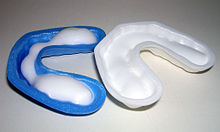If you were born in or around my generation and you had regular dental check-ups you will probably remember these…fluoride treatment trays. I’m not sure about you but I definitely do not associate these with fun times; in fact I distinctly remember watching a fellow patient as he “lost his lunch” shortly after the trays were inserted into his mouth! Needless to say, I never looked forward to this part of my dental visit…everything else seemed like a breeze in comparison!
Fluoride treatments, fluoride toothpaste, fluoridated water…all of these seem pretty commonplace, right? Did you also know that fluoride is contained in many well-known pharmaceuticals (e.g., Lipitor, Paxil, Cipro, Flonase)?
Fluoride is the only drug that is forced as mass medication of the population with no control of dosing (fluoridealert.org)
More and more information is coming to light, however, that shows the more fluoride does not equal the better! In fact, it has been linked to increased bone & tooth damage and it can have negative effects on many organs including the brain, liver, kidney, lungs, gastrointestinal tract, blood vessels, skin, and thyroid.
For example, fluoride displaces iodine in the body; iodine is detected in every organ and tissue in the body and especially high levels are found in the skin, eyes, thyroid, stomach, breast, saliva, heart, brain, lung, liver, ovaries, and adrenals. It is essential in pregnancy; in fact, severe iodine deficiency in pregnancy causes Cretinism (a severe form of mental retardation) in the infant.
Take a look at this infographic from the Fluoride Action Network.
Important Things to Note:
- fluoride is an environmental toxin that pollutes both the air and the water
- fluoride is a key ingredient in some pesticides & fumigants
- Infants are the most vulnerable to fluoride toxicity which may affect not only their teeth in the future but it can also cause neurological impairment starting in infancy!
- fluoride is more toxic than lead, but slightly less toxic than arsenic
What can you do to reduce your exposure to fluoride? Stay tuned!
Related articles
- Fluoride toxicity – Protect yourself with selenium (naturalremediesblog.net)
- Fluoride – The Hard to Swallow Truth (Full Version) (undergrounddocumentaries.com)
- Fluoridation move sparks controversy (fijitimes.com)
- League of Women Voters sponsors forum on fluoridation (kansas.com)
- Sodium Fluoride: Poison In The Tap Water (lynleahz.com)
- Harvard Study Suggests that Fluoride Lowers IQ (economicpolicyjournal.com)
- Fluoride Linked to #1 Cause of Death in New Research (love2ascend.com)
- Yet more studies link fluoride to brain damage. (myscienceacademy.org)
- What the research says about fluoride (oregonlive.com)
- Sean Dix and Fluoride: The Hidden Assassin (ascendingstarseed.wordpress.com)


